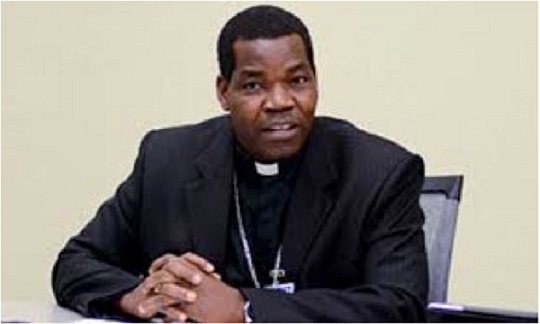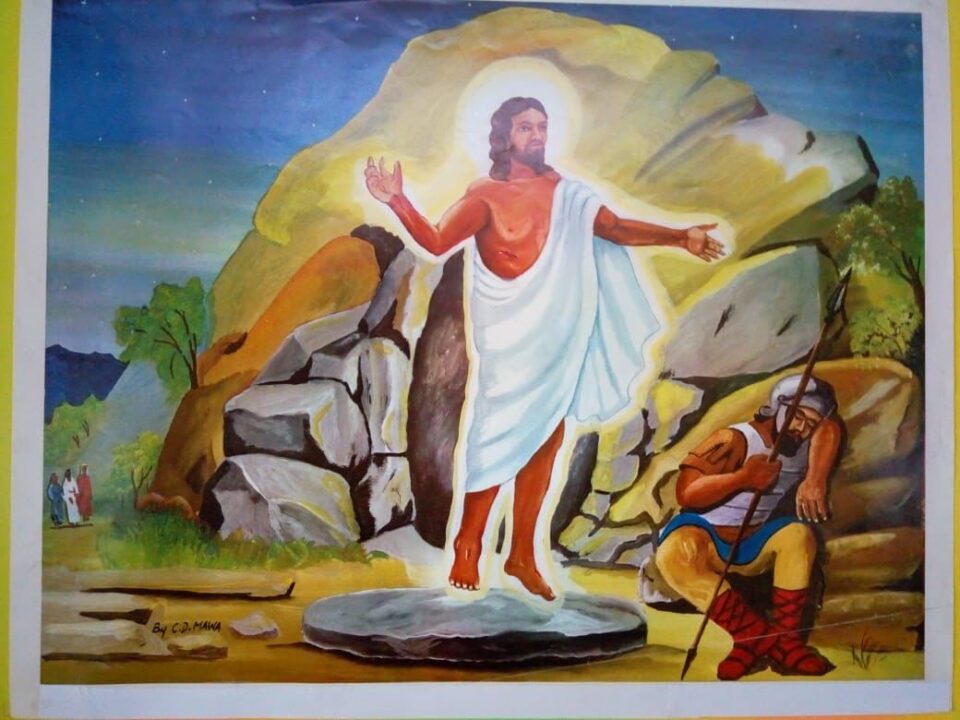- Contact us on - Contactez-nous sur - Contacte-nos em
- +233-30-277-8867/8
- +233-30-277-2548
- secam@secam.org
Help South Sudan Despite “too much bureaucracy,” SCBC President Appeals to International Community: Interview Part 2
Help South Sudan Despite “too much bureaucracy,” SCBC President Appeals to International Community: Interview Part 2
CANAA || By Father Don Bosco Onyalla, Nairobi || 19 January 2017
 The new President of Sudan Catholic Bishops’ Conference (SCBC), Bishop Barani Eduardo Hiiboro Kusala of the Catholic diocese of Tombura-Yambio in South Sudan, has called on the international community to come to the aid of the citizens of his country despite “too much bureaucracy.”
The new President of Sudan Catholic Bishops’ Conference (SCBC), Bishop Barani Eduardo Hiiboro Kusala of the Catholic diocese of Tombura-Yambio in South Sudan, has called on the international community to come to the aid of the citizens of his country despite “too much bureaucracy.”
He made the appeal in an interview with CANAA on Monday, January 16. Making reference to countries that have accepted to host those who have fled the conflict in South Sudan, Bishop Barani said, “we know there is too much bureaucracy, but let them help our country; let them help us as they did help us to get the CPA (Comprehensive Peace Agreement), let them help us to get these problems solved.”
He extended the appeal to the wide international community members saying, “Let them not wait to come and count how many people have died, no!”
Below is the full text of the 2nd part of interview with Bishop Barani. Part 1 interview is available here.
CANAA: The conflict in South Sudan has gone on for a long time now, putting the world’s newest nation in the news for the wrong reason. What is the situation now?
Bishop Barani: I would call the situation now as conflict at standstill, where we have not resolved the problems of the country. They (the problems) are there before us; people are looking at them and looking at ways of making their ways through them, but the problems are still there. We still have armed men in the bush. And they are known gunmen. These armed men are the ones controlling the country. The safety of the people to be free to move, to do things is not there. So, with these arms in the hands of those who are holding them, they are holding the country hostage, making it difficult for the country to do what it should do, and people who want to do the right thing, it is difficult for them; anyone who wants to come into the country to join hands with us is afraid to come in. It is in a way covering the (entire) country to make it almost unable to work, because economically, we are in a very big fix. There is not enough money to run services (including) hospitals, schools, and other services; humanitarian (assistance) is a big issue. There are a lot of people now who have no food, like where I come from, a lot of people who have left their own homes because of this conflict and in the refugee camps you still hear bad stories. And there is huge mistrust that is among people, divisions, hatred, and a breakdown of law and order. So, this situation is complex.
CANAA: In the face of this complex situation of conflict, which you are describing, especially the protracted nature it seems to be taking, where would you locate the role of the Church in finding a lasting solution?
Bishop Barani: For me as a Churchman, I see within this (that) our role is till viable. We are there with the people, we stay with the people, we pray with the people, and we still have hope that in spite of all this, if people want, they can be converted to believe in God and in the fact that the country of South Sudan is ours, and it has been given to us by God and it is we to build it, it is we to serve it, it is we provide the necessary security, then this will happen. And we are praying for this miracle that we get converted to believe that the country of South Sudan is ours, given to us by God, and we are children of God, and we must live together. So, this could help us to go beyond ethnicity, people dividing along the lines of their tribes, their regions, and it is not going to take us anywhere.
That is why as a Church we have a program. We have decided to work, to gather all the Churches in the country through our Council and now we are going to push this through our Conference (of Catholic Bishops) on this whole issue of (an) open forum. The president (of the Republic of South Sudan) recently talked about national dialogue. This is what we have been talking about: (an) open forum where people should tell their stories, people should tell their stories and be safe at the end of it; so that when I tell my story, then I don’t meet somebody going to hunt (after) me on why did I say that? This open forum will allow people to bring their grievances within themselves, and there must be listening ears that will receive this information; and then the law to protect and be able to find a remedy for this.
The second thing is advocacy. We need to keep on talking about the reality and the situation happening within the area, selling the stories among ourselves, our neighboring countries, which are in the region to be able to listen and to be able to come to our aid, and to the international community. And this has to continue as much as possible to reach to everyone who can help us.
The third thing is reconciliation. The process of reconciliation is not a quick thing. We have to go slowly. It need instruments (of reconciliation) to be there because reconciliation never comes if people are still scared, afraid, and have not been able to tell their stories. So, reconciliation must be there, and a duty counting on all of us: from the Church and to whoever we must get to talk to person to person, community to community, village to village, county to county, state to state, so that we get rid of all those problems, and if we acknowledge them, then eventually healing will be coming. And healing will follow that process that takes us long time and the result of peace, and then people will be able to enjoy their country (of South Sudan). So, this is where we are going.
We insist that South Sudan, I’m telling you, has the highest number of Church goers. The paradox is that all these people going to the Church but then you find majority of whom still go back to kill each other, to fight, and you ask yourself: why do these people go to Church? So, we are praying for this miracle that we get converted truly to God and by that conversion we can be able to forgive, and be able to stay with one another.
CANAA: Indeed, through your message of hope for the miracle of true conversion to God, you are showing a spirit of optimism for a better future for the people of South Sudan. What message do you have for the citizens of the African continent as a Church leader in South Sudan?
Bishop Barani: My message is: As the Holy Father says, violence can never solve the problems that we have; the guns would never do that. It is our country, it is our place, people have got to dialogue; people have got to talk to each other; and people have got to listen to each other. And that is the only way we can be able to solve our problems.
The other thing is that those who are actually in power, who can make things change, have got to be serious, that they are carrying and implementing a program that can save life and protect life. It is funny in Africa where someone is killed (and) no one is taking action; no one loses power or his position because human beings have been lost or have been killed. In some countries, (human life) is a value; that I put my hand to defend the constitution and the life of the people of my country. And if anybody is lost, if somebody is taken (away), then the whole country is in need.
(For instance), I am here today in Nairobi. If anything happens now that Bishop Eduardo (who was) in Nairobi is lost, we don’t know where he is, do you think my country will be in panic? They may not. It’s just, oh what happened to the bishop, finished; the story will end up there. But if I were a British or any country in Europe, the whole country will be looking for this one single human being. So, my appeal is that let us value life in Africa. In our constitution, it should be enshrined and we have to protect whoever is there as a human being, he needs to be protected.
Finally, I would like to appeal to neighboring countries. We thank Kenya, we thank Uganda, Ethiopia, Sudan, for the support they give to all these people who are running there for refuge. But, we also need their support to heal the wounds in South Sudan. We need their effort to make sure that right things are done in South Sudan. If they are happy to receive refugees, then let them be onlookers to the problems in South Sudan. But I think my appeal should be, we know there is too much bureaucracy, but let them help our country; let them help us as they did help us to get the CPA (Comprehensive Peace Agreement), let them help us to get these problems solved. The communities in Africa, the neighboring countries, let them have an impact on our system, the government in South Sudan and all the structures.
Then the international community, let them not wait to come and count how many people have died, no! I think prevention is better than cure. I would appeal, let the people of South Sudan feel that they have individuals who are there to support them.
And I finally ask all the Christians, all our Catholics to continue to pray for us. Please, pray, and pray for us. I think that will be the best gift because we know God is going to give us the peace we need. And when (we have) a peaceful South Sudan, it will be a peaceful Kenya, a peaceful Uganda, a peaceful Tanzania, Ethiopia, Sudan, and all our neighboring countries. Thank you and God bless you.

